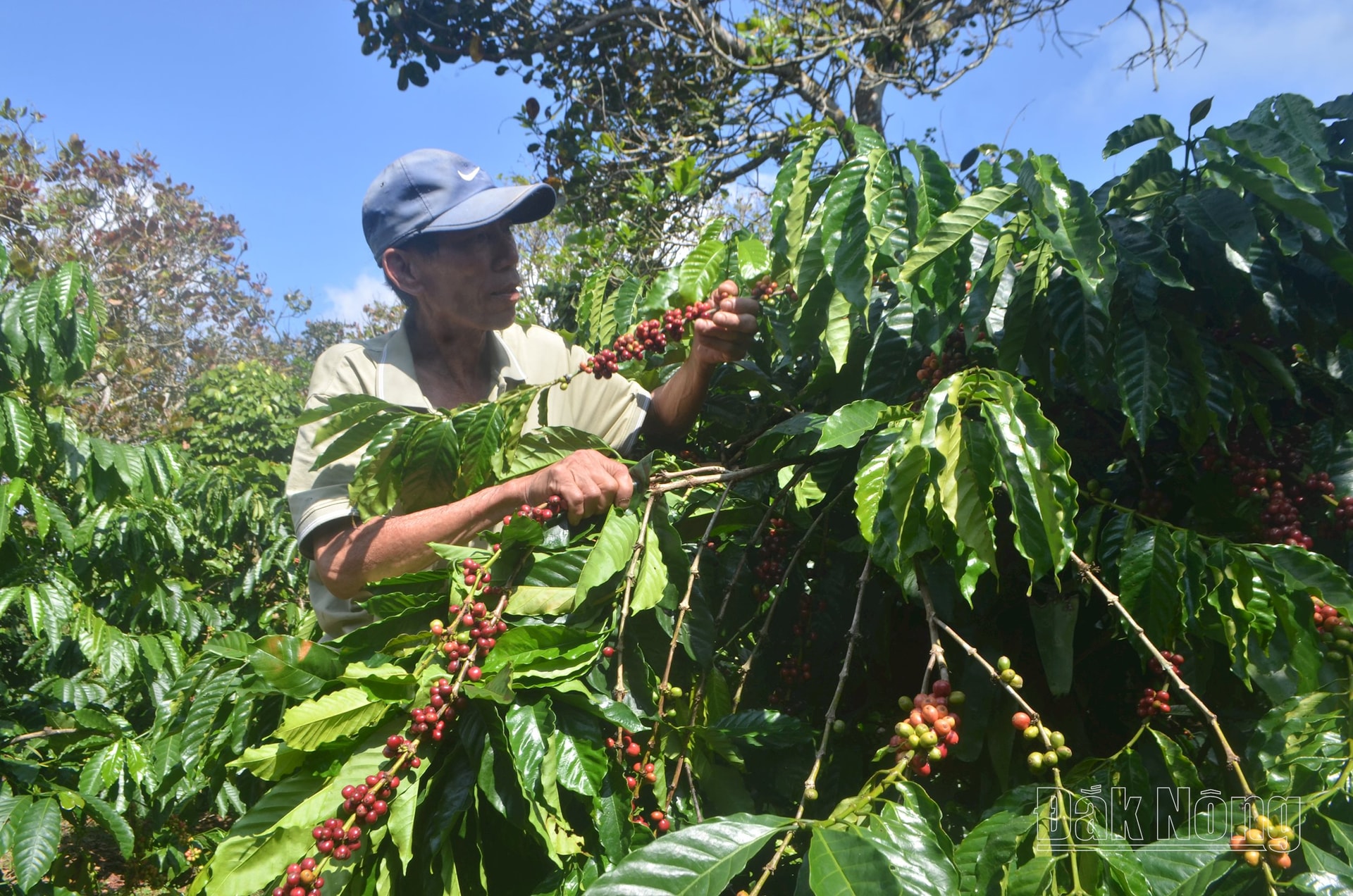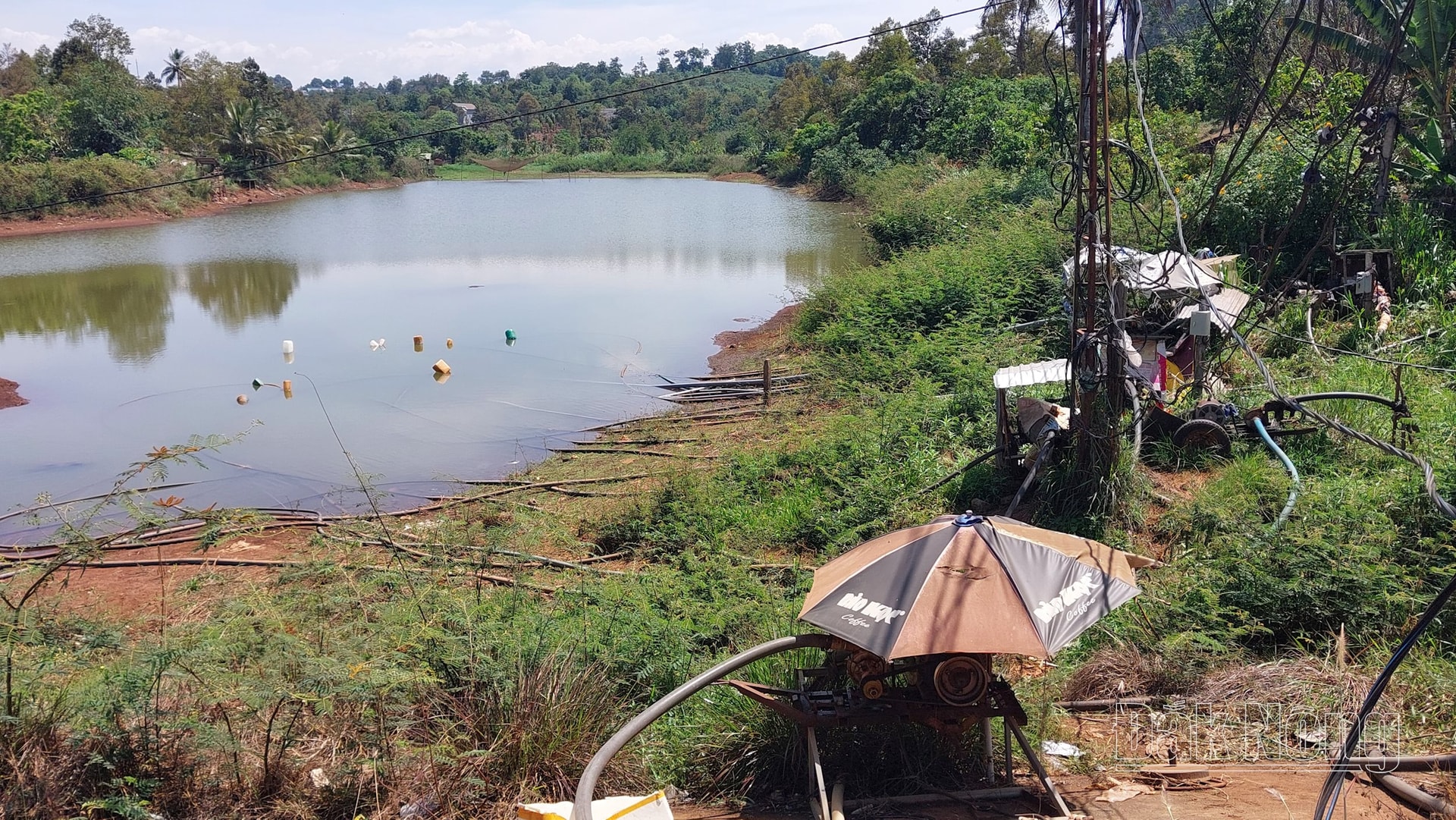Severe consequences
2024 is considered one of the most severe drought years in Dak Nong province in many years. From the beginning of the year, the prolonged lack of rain has seriously affected thousands of hectares of crops, while domestic water sources in many localities have gradually dried up, causing great difficulties for people's lives.
In districts such as Krong No, Cu Jut, Dak Mil and Dak R'lap, many crop areas suffered from drought, leading to a 30-70% reduction in productivity compared to previous years. The biggest impact was on coffee, followed by short-term crops.

Mr. Dang Xuan Doai, village 15, Dak D'rong commune, Cu Jut district said that drought occurs every year in the area, but 2024 is the most severe ever.
In more than 30 years of living in the area, he has never seen his family's durian garden and short-term crops grow so poorly and have such low productivity. Entering the dry season, drought occurred again and both wells used for irrigation and daily life of his family completely ran out of water.
According to Mr. Doai, the rainy season ends in September 2023 and lasts until the end of 2024 with only a few light rains, not enough to improve soil moisture. Meanwhile, high temperatures for many days at a time make it even harder for crops to withstand.

Dak Nong has more than 131,000 hectares of coffee in the harvest period. Due to drought, coffee productivity in 2024 decreased significantly compared to the previous year, especially in some communes in Dak R'lap and Cu Jut districts with a decrease of 4-7 quintals/ha. Due to the decrease in productivity, the province's total coffee output in 2024 will only reach about 343,000 tons, a decrease of more than 16,400 tons compared to 2023.
Not only affecting agriculture , drought also causes surface water and groundwater resources in the whole province to decline rapidly. Hundreds of dug wells, drilled wells and many centralized water supply works in localities have been exhausted. According to the report at the meeting of the Provincial People's Committee on April 22, 2024, the whole province has about 500 households lacking domestic water.
.jpg)
In Krong No district, about 350 households in Luong Son village (Nam Xuan commune), Dak Pri hamlet and Nam Giao village (Nam N'dir commune) are facing serious water shortages.
Meanwhile, in Si At village, Dak Ngo commune (Tuy Duc district), about 150 households are also facing difficulties because they do not have clean water facilities or the facilities are degraded and damaged. The depletion of water resources has made dug wells and drilled wells in many places unusable.
The dry season of 2024 also increases the risk of forest fires due to high temperatures and a sharp decrease in humidity in the forest. According to statistics from the authorities, in 2024, the whole province had 42 violations of regulations on forest fire prevention and fighting, an increase of 30 cases compared to 2023.
Of these, 8 forest fires occurred with an area of over 2 hectares; 34 fires occurred in unforested crops, with an area of over 41 hectares. The localities with the highest number of forest fires were Dak Glong district, Tuy Duc district and Gia Nghia city.
A report from the Department of Agriculture and Environment of Dak Nong province shows that in 2024, more than 10,721 hectares of crops in the province were affected by drought, causing estimated damage of about 430 billion VND.
In the dry season, worry about drought
Entering 2025, the drought situation continues to be severe. According to the report of the Department of Agriculture, in early April 2025, the dry season this year was generally dry, with average temperatures ranging from 15 - 34 degrees Celsius and humidity ranging from 70 - 78%.
Northern areas of the province such as Cu Jut and Krong No are forecasted to experience 1-3 local heat waves from the second half of March to early May 2025, leading to severe drought.
.jpg)
This year’s dry season has seen water levels in rivers and streams continue to decline. To date, many rivers, streams, ponds and lakes have dried up. Water reserves in irrigation reservoirs have also dropped rapidly.
Although some areas in the southern part of the province had light rain (less than 5mm) in late March and early April, it was not enough to improve the drought situation. Meanwhile, the northern areas such as Cu Jut, Krong No, and Dak Mil still had no rain, making the drought and water shortage even more serious.

The total capacity of dams in the province is currently only about 55%. Notably, 17 dams managed by Dak Nong Irrigation Works Exploitation Company Limited have run out of water, an increase of 8 projects compared to the end of March 2025.
Projects such as Doi 35 Lake, Doi 40 Lake, Dak Mbai Lake, Tang Gia Lake (Dak Lao Commune), Manh Thang Cooperative Dam, Doi 3 Lake (Duc Manh Commune), Xu Dang Lake (Dak N'Drung Commune, Dak Song District) are now all out of water.
In the "drought center" of Dak Mil, the area of crops affected by drought and water shortage has reached more than 4,700 hectares. In addition, about 270 households are facing difficulties in domestic water supply during this dry season.
The most affected communes include: Dak Gan (950ha), Dak Lao (900ha), Duc Manh (756ha), Dak R'la (602ha) and Dak N'Drot (500ha), with the majority of the area being coffee and pepper.
.jpg)
According to a report from the Department of Agriculture and Environment of Dak Nong province, drought in Dak Nong in recent years has become increasingly severe, leaving serious consequences for agricultural production.
In 2016, the whole province had 210 hectares of rice fields forced to stop production right from the beginning of the season, while over 20,000 hectares of key industrial crops such as coffee and pepper were seriously affected, leading to a sharp decrease in productivity due to drought.
By 2020, the area of crops damaged by drought in Dak Nong had skyrocketed, reaching about 24,900 hectares, mainly concentrated in coffee and pepper growing areas - key crops that provide livelihoods for thousands of households.
In 2021, although the level has decreased, it still recorded 1,257 hectares of crops of all kinds affected by drought. In 2024, Dak Nong had 10,721 hectares of crops affected by drought. In 2025, although the dry season has not passed, Dak Nong had more than 5,000 hectares of crops affected by drought, threatening productivity.
These figures clearly reflect the severity and persistence of drought in Dak Nong, posing an urgent need for effective and sustainable response solutions.
According to the Department of Agriculture and Environment, in 2024, Dak Nong will have a total of 10,721 hectares of crops affected by drought. Of which, Krong No 4,780 hectares; Dak R'lap 2,795 hectares; Dak Mil 1,496 hectares; Tuy Duc 1,320 hectares; Gia Nghia 300 hectares; Cu Jut 25 hectares; Dak Song 5 hectares.
Source: https://baodaknong.vn/han-han-o-dak-nong-ngay-cang-khoc-liet-249070.html






























































































![[Infographic] In 2025, 47 products will achieve national OCOP](https://vphoto.vietnam.vn/thumb/402x226/vietnam/resource/IMAGE/2025/7/16/5d672398b0744db3ab920e05db8e5b7d)





Comment (0)